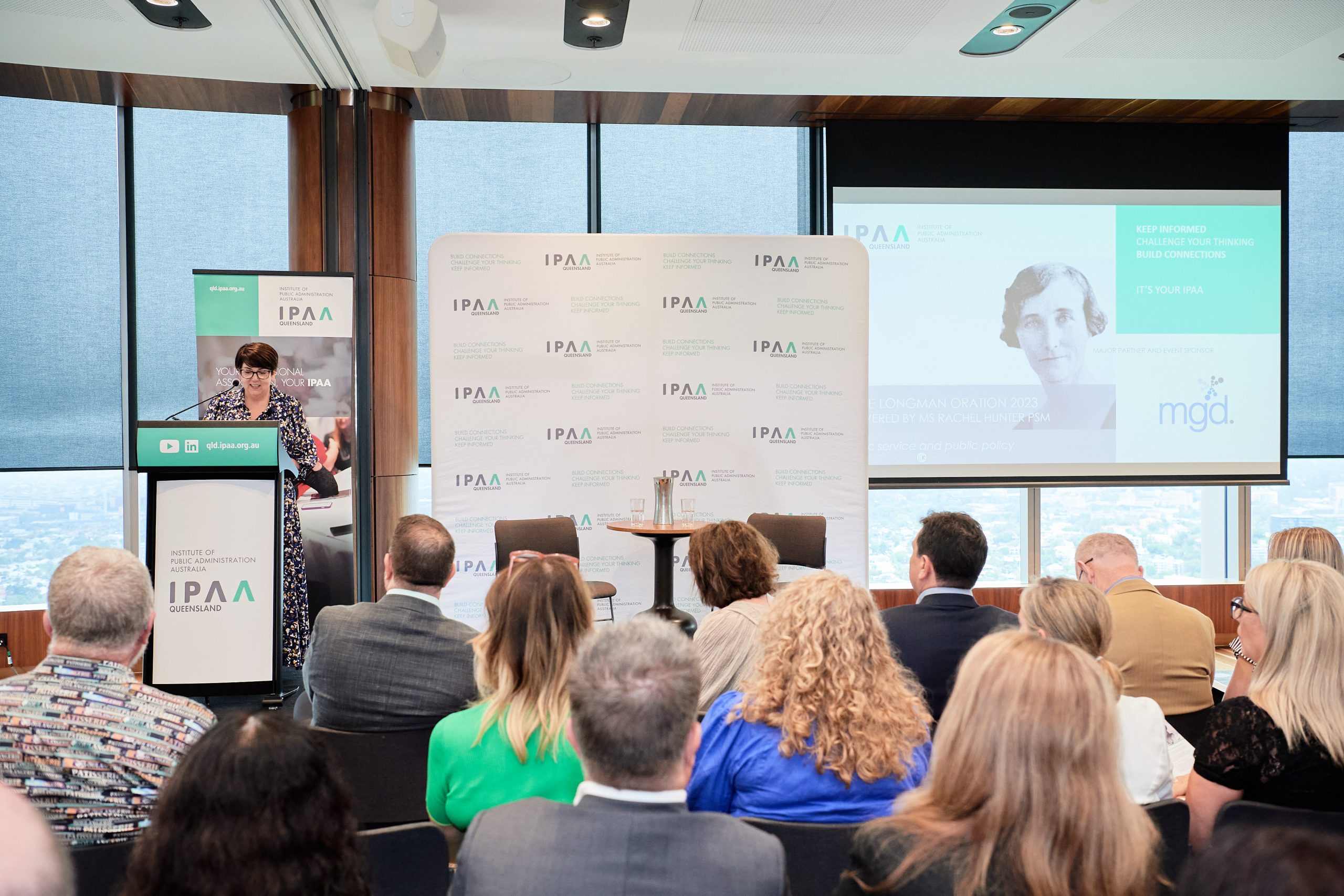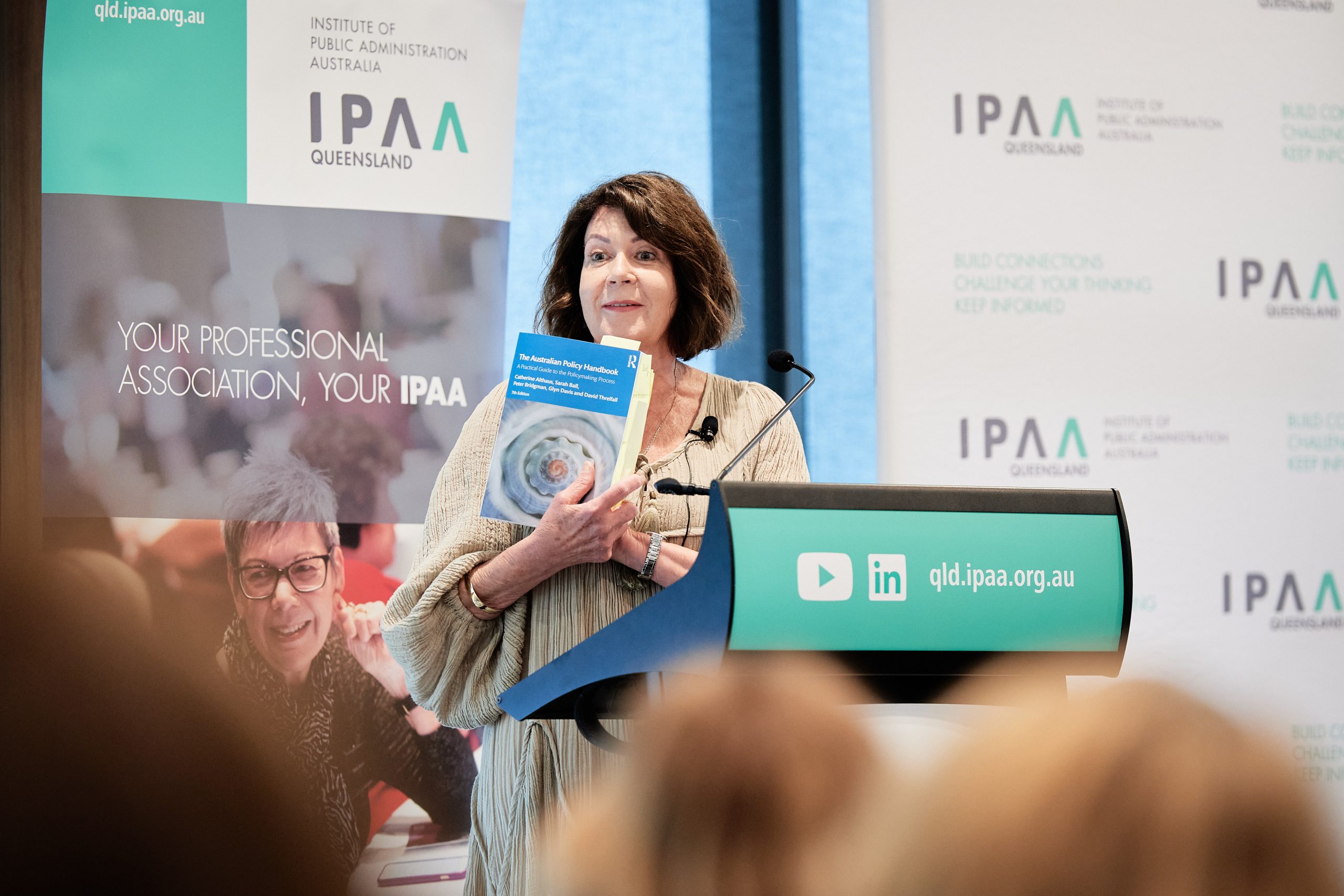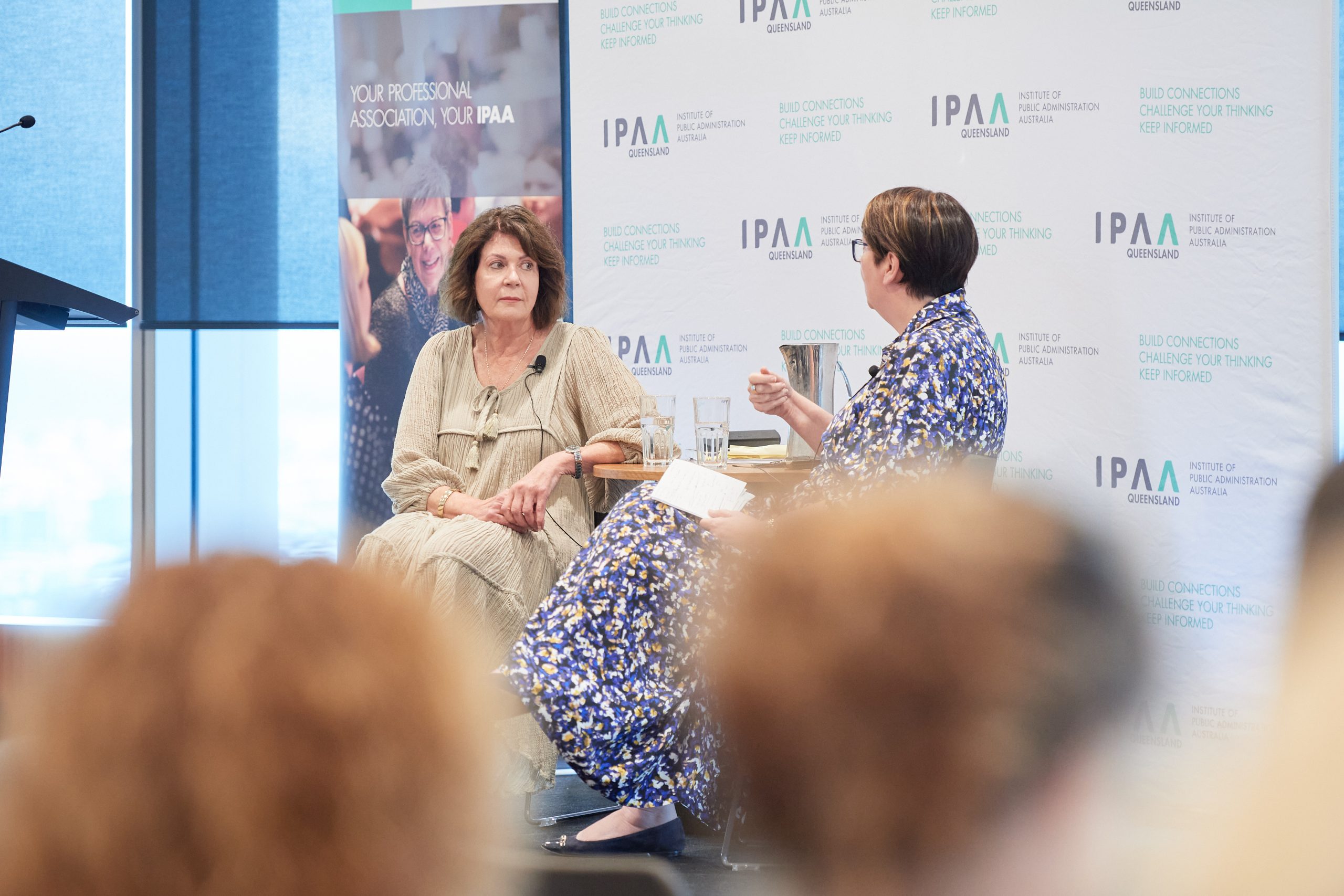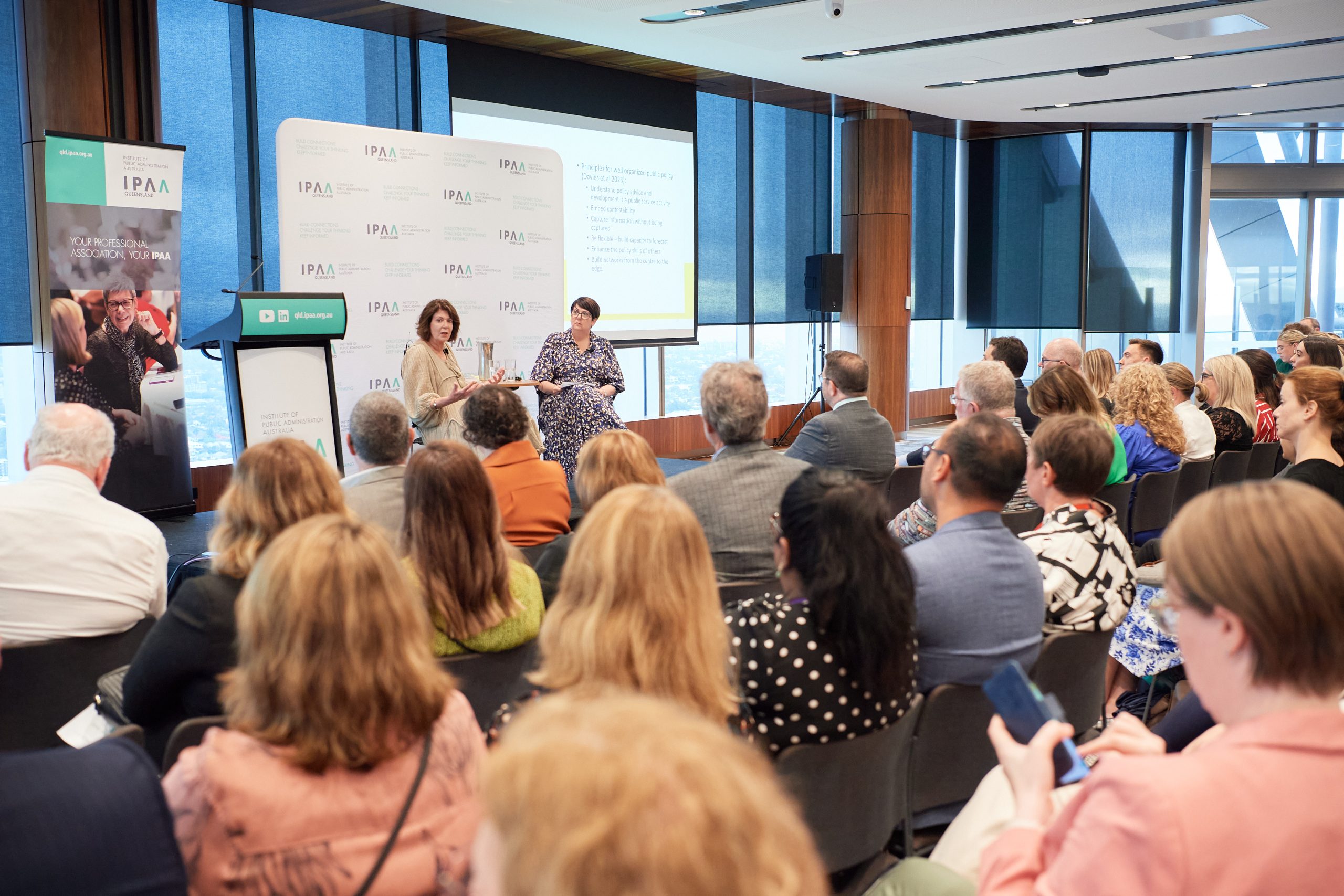Rachel Hunter’s ‘politicy’: How politics and policy create public value
On the 21st November, IPAA Queensland was delighted to host the 2023 Irene Longman Oration, delivered by Ms Rachel Hunter PSM, and supported by our major partner MGD Wealth.
Under the theme “Public Servants and Public Policy”, Ms Hunter spoke to the important role of public servants as policy enablers and advisors, and as champions of public value. Through her Oration, she delivered a legacy speech and offered a new term to capture and highlight the importance of both politics and policy in achieving outcomes for the public good.
To a captivated room of one hundred IPAA Queensland members and senior public sector leaders, she reflected on how the relationship between public servants and elected government can be reframed as a policy-partnership in service to democracy and the community.
The following edited extract from the lecture provides key insights:
“In essence, amidst all of this uncertainty, citizens look to government, to political and public sector leaders to demonstrate accountability for sensible policy outcomes. My simple way of summarising that is outcomes which clarify the problem, which deliver public value, that achieve a positive outcome for citizens, that cohere political interests, that are more centrist in their approach to policymaking. Bringing people together around solutions is absolutely critical for public confidence and trust in the policymaking process. This requires pragmatism and an outcomes orientation. My colleague Mike Kaiser says, you’re better off being 80% right and getting on with stuff (I think that I’m not verballing you, Mike) than waiting for perfection. Exercising pragmatism.
Some of that comes with instinct and a lot of it comes with experience. Understanding what works often has its roots in things that didn’t work – learning from failure and applying those learnings to implementation planning. Because remember, great policy is only great policy when it has great outcomes on the ground, and demonstrates probity and integrity. Of course, there’s been a significant focus nationally and clearly here in Queensland on the integrity of systems in the public sector and in government. We all understand that in order to build and maintain trust with citizens, consumers of public policy and public services, they have to have confidence in the integrity of the processes and systems that design and deliver them.
In particular, the relationship between the political and the policy arms of government I think needs to be re-conceptualised in this age of disruption. The importance of that relationship needs to be reinstated.
This will demand new thinking.
Government ministers and the public sector have an opportunity to re-base their relationship as a policy rich partnership. I’ve really spent a lot of time thinking about this issue of the relationship between the government of the day, the elected officials, and the public service. The dynamic in that relationship, particularly when you look federally, has shifted over time. I’ve actually coined a new term to describe the importance of this relationship.
That term is ‘politicy’.
You take the political arm, you take the policy arm and you create a new word, which is what I’ve done. I’ve done it because I actually believe we need to disrupt the way we have perceived and currently conceive the relationship and the crucial interconnections between policy leadership from government Ministers and policy influence, implementation and leadership from the public service.
This is not a competition.
This is a fundamental policy relationship that leads to better policy outcomes. You can see I’ve borrowed the quote from the Australian Policy Handbook, which goes to the intensity, the complexity, the ambiguity, and the paradox, that is public policymaking.”
Ms Hunter’s years of experience stewarding public sector agencies and working at the nexus between bureaucracy, policy making, and executive government allows her to provide unique insights about the relationship between government and the public service. She drew on Mark Moore’s groundbreaking work on ‘public value’ and provided pragmatic reflections on how public servants play a role in value creation.
She said that:
“Sometimes the roles and responsibilities of ministers and senior public servants become confused in that policy development, policy administration space. Again, I think it’s fundamentally important for senior public service leaders to be able to navigate that space and clarify those roles and responsibilities in a way that builds relationships rather than detracts from relationships. Government is accountable for making policy which delivers good outcomes for citizens. Determining what citizens want or expect as a collective has become increasingly complex for government. This is because the collective is not naturally a cohesive group. Rather, it comprises multiple groups all driven by their own self-interests. Good outcomes for one group are not necessarily good for another. Governments either have ways to cohere and bring the collective together, or to persuade one group that it’s better to follow this path for that group because it has a better outcome overall.
This introduces the concept of public value, which of course, stemmed from work done at Harvard University by Mark Moore. He compared the work of public sector managers with that work of those in the public sector, private sector, sorry, and argued that governments do and should define and deliver public value, which is the equivalent of value delivered to the shareholder in a private sector organisation.
Moore argued that the creation of public value was challenging because it brings us out of the world of the individual and back into the world of interdependence and the collective. Which is my argument. That’s where good public policy happens, in the world of interdependence and the world of the collective public. Value is a metaphor for return on investment. That is the return to the shareholder, the citizen, from the efforts of leaders and managers in public administration, ministers and public policy makers.
This concept of public value or greater good requires vision, strategy, open conversation between politicians, public servants, and citizens. It requires courage in an era where citizens apply the what’s-in-it-for-me lens to public policy. These conversations carry risk and they take courage.
However, the greater risk is not to have those conversations. In the absence of mature and robust public deliberation and dialogue, citizens can be hijacked by minority positions, which promote quick fix, remedies and rewards. To deliver public value, Moore has argued that public sector leaders need to step up. That’s us. They need to engage with policy development by negotiating purposes with politicians and leading public deliberation and discussion and social learning. In other words, bringing their authority and expertise to enhance the public policy process. No more faceless bureaucrat. Moore is saying, we have to step up.
We have to step up, engage, and be visible.
The processes of policymaking also need to change. Good policy relies on processes which are founded in stakeholder pragmatism. That is a process of working out what disparate individuals want as they work their way through what it seems possible for them to get. Bringing people to a space where they accept what is possible. Stakeholder relationship engagement is highly complex and it requires highly attuned sensitivity to the reactions of disparate groups. The work of public policy makers is to bring people together to create the collective.”
Ms Rachel Hunter delivered the 2023 Irene Longman Oration with passion and authenticity; and spoke to the need for the public service to face the challenges that are present in the current policy making environment.
The Irene Longman Oration is proudly supported by our major partner
About IPAA QueenslaND:
Like what you have read here? Join as an individual member to enjoy these insights and more.
IPAA Queensland advances the professionalism, capability and integrity of public administration and public purpose work and promotes pride in service.
If you’re a public servant or engaged in public purpose work, we encourage you to get to know and connect with IPAA Queensland. Find out more about us by reading more on our site or through joining as a member.
About IPAA Queensland’s Irene Longman Oration:
The annual IPAA Queensland oration is named in honour of Irene Longman, the first female elected to the Queensland Parliament (1929-1932) and dedicated ‘public servant’ to the community for over 30 years. Her values and legacy included the welfare of women, children and people with intellectual disabilities; establishing the first education opportunity classes; the first women police in Queensland; creating a separate Children’s Court; and for the appointment of an advisory panel in difficult cases of juvenile delinquency.
The oration is an annual flagship event, similar to the national IPAA Oration – the Garran Oration (in honour of Sir Robert Garran, the first Commonwealth public servant), and other state and territory level IPAA orations (see Appendix A for further detail). The key intent is to honour an individual and their contribution to the field of public administration. It is delivered by a prominent leader or thought leader who will focus on a relevant aspect of the sector to encourage public interest and contemporary thinking.
IPAA Queensland’s Irene Longman Oration seeks to provide a unique opportunity for IPAA Queensland members and a select group of senior public servants and IPAA stakeholders to hear from a prominent leader with a focus on a relevant theme for the sector, and to encourage contemporary thinking.
About Ms Rachel Hunter PSM:
Ms Rachel Hunter is a highly regarded and accomplished Director-General and Chief Executive, having worked across various portfolios over an extensive career.
A distinguished public sector leader, Ms Hunter is the first female Director-General of the Department of the Premier and Cabinet in Queensland since the department’s inception in 1859.
Ms Hunter brings to the role an outcomes-focused and values-led leadership style.
As Queensland’s former Under Treasurer, Ms Hunter was at the helm of Queensland Treasury at a most critical time as the government responded to the global COVID-19 pandemic. As Under Treasurer she was instrumental in shaping and delivering on the government’s economic response and recovery plans for the state.
Ms Hunter has been Director-General of three Queensland Government departments – the Department of Justice and Attorney-General, the Department of Education, Training and the Arts and the former Department of State Development, Manufacturing, Infrastructure and Planning. She also served as Queensland’s Public Service Commissioner between 2001 and 2003.
Ms Hunter is a member of the Trade and Investment Queensland Board, Building Queensland Board and the National First Secretaries Group. She also served as the Deputy Chancellor, Griffith University.
Ms Hunter has chaired the Board of Jobs Queensland providing industry and evidence-based advice on skills needs and workforce planning and has served as the Chair of Children’s Health Queensland.
In 2020, Ms Hunter was awarded a Public Service Medal for outstanding public service to the community of Queensland.







